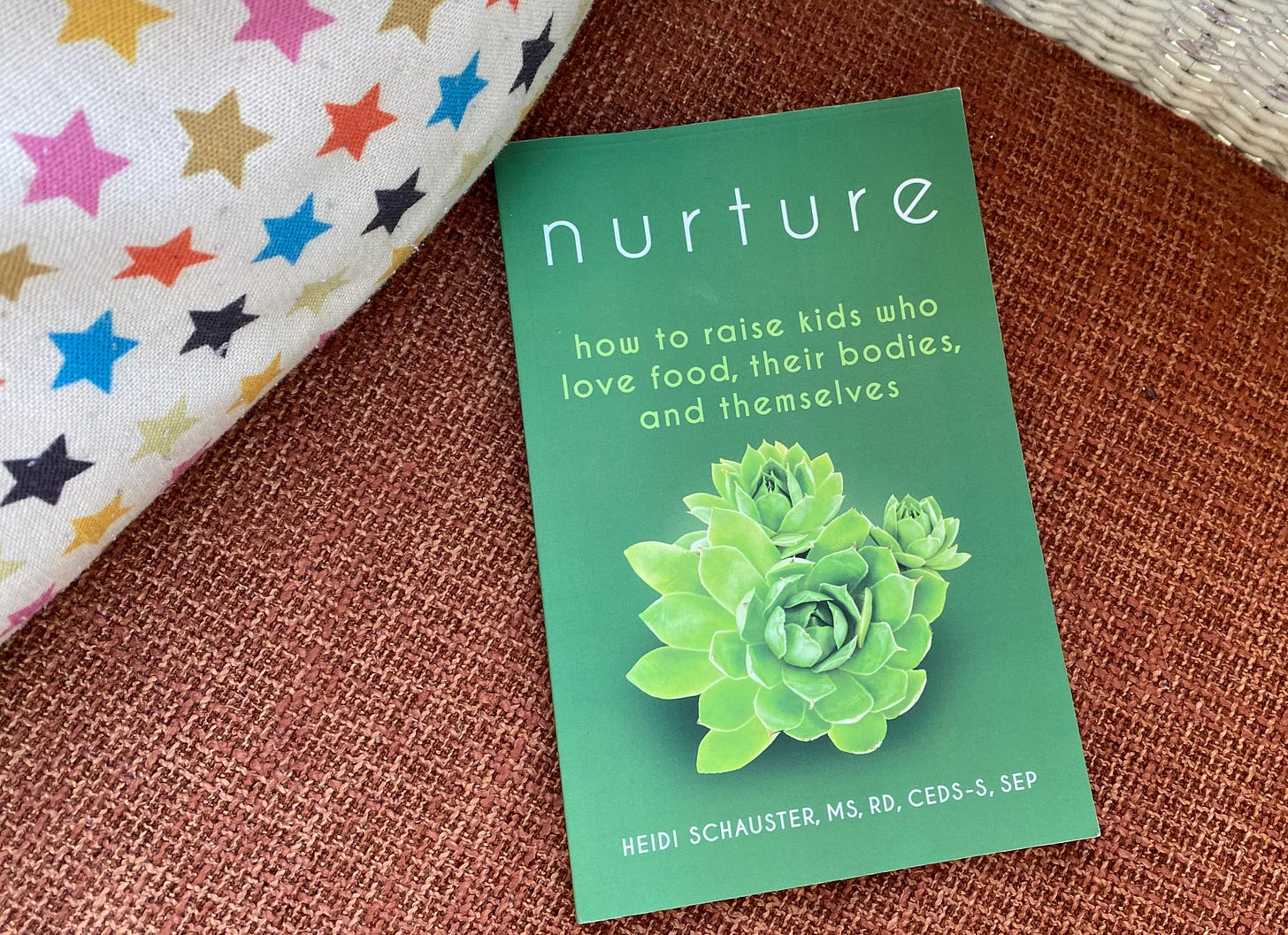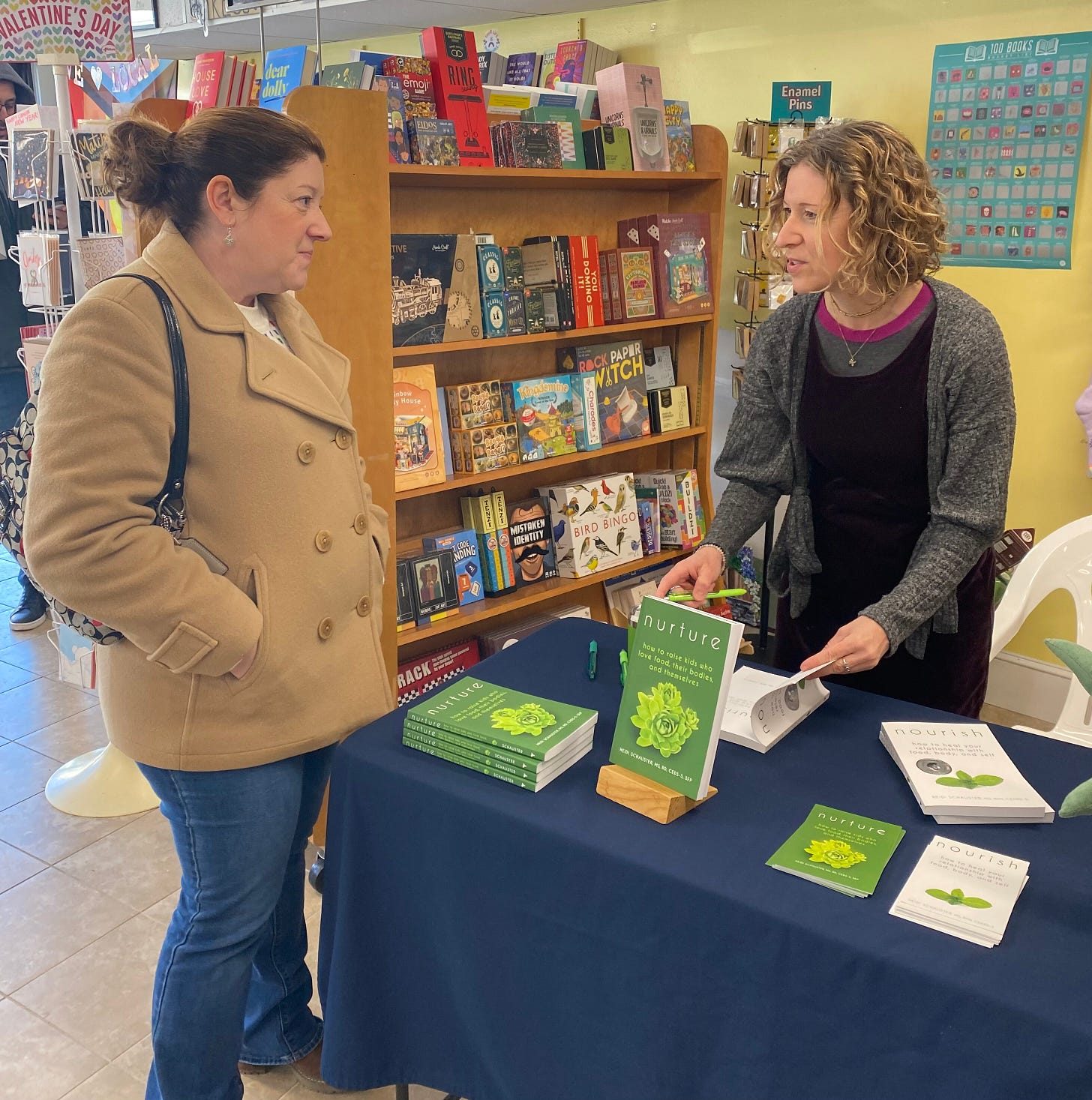How to Raise Kids to Love Food and Respect Their Bodies
Lessons from a Social Media Project with my Gen Z Daughter
If you’ve followed my writing and social media for a while, you may have enjoyed some of the videos with my 19-year-old daughter Ava discussing dieting behavior in college, fashioned after the #cookwithme trend. She and I started this project for Eating Disorders Awareness Week (EDAW), and I continued to edit the recording of our unrehearsed kitchen conversation into fourteen little one-minute videos for a few different social media platforms.
Why? Because I’m working on my third book for young adults, I thought I should get with the program and create video content since that’s what teens and twenty-somethings relate to most. (If you are a writer or creator, you know that meeting your audience where they are is incredibly important.)
You can watch the first seven videos here in this post and laugh when she calls me “bro.” They were posted one per day on three social media platforms during EDAW.
The final seven videos of the series are posted below for your interest so that you don’t have to visit my new TikTok, IG, or YouTube accounts if you don’t want to. (Though I’m happy to connect with you on those platforms if you’re also there! Honestly, if it wasn’t for the kids, I’d only be on Substack.)
You can see that the videos are as much about me sharing some of my thoughts about scary diet trends as they are about my daughter trying to coach me to look at the camera. The moments of lightness between us around my awkward media presence next to my Gen Z star are some of the best parts of the videos.
This last one was rather popular, since my daughter insisted I reveal the name of my sourdough starter. I will remind you that these videos were based on one take and zero planned content except we decided we wanted to discuss why young people need carbs.
Twin sister Kyla is already plotting how she and I can make a follow-up series, once she’s done with exams and comes home for the summer. In the last and fourteenth video in the series, Ava and I finally get around to talking about my book(s).
I completed this fun but time-consuming project with Ava because I deeply care about encouraging parents to talk to their teens about the toxic influences of diet and fitness culture. (Please don’t stop when they are out of the house in college or working). Eating disorders, dysregulated eating, and poor self-care are so common on college campuses, and young people need adult role models who champion embodiment, balance, and body liberation.
How do we do that—especially if we might not always feel great about our bodies or if our food consumption doesn’t always feel balanced and self-loving?
We do our best.
I wrote all about this in my last book, Nurture: How to Raise Kids Who Love Food, Their Bodies, and Themselves. I was far from perfect in my approach to food with my daughters. You can see in the last video how Ava calls me out for chasing her and her sister out the door with “protein—not breakfast—protein!” I know better than to push food on a child or teen and to use a term like “protein” with a young person who could care less about nutrition.
Yes, I did want my daughters to eat a balanced meal in the morning so it would help them get through their school day and we could avoid the “hangry” once school was out, but I crossed a line and moved into their lane of responsibility when I tried to push the meal on them. There’s a difference between making good food available for our children and coercing them to eat it.
I know I crossed that line a few times. I also know that parents want compassion and solidarity when feeding young people. My book encourages progress, not perfection.
Here are some things you can do if you care for or are around children to help them develop a good relationship with food and their bodies.
Speak kindly about your own body in front of children. (If you are a parent, remember that your kids may look like you someday.)
Avoid criticizing (or even overly praising) the bodies of others in front of young people.
Don’t follow a restricted diet, unless you need to for medical reasons. The kids are watching.
Avoid making children eat anything; make a balanced diet available, and let children learn to self-regulate. (This is a complicated topic that got a whole chapter in my book.)
Encourage joyful, embodied movement instead of moving to burn calories or count steps.
Teach by example: have some of your own sustaining self-care practices that soothe you and help with emotional regulation.
Demonstrate that food is a pleasure and something that brings people together, nourishing on many levels.
Teach young people that expressing feelings is important and that feelings are located in the body. Tell them their body is wise and can be trusted.
Focus on the whole self of your children, especially when you see them preoccupied with their appearance (which will likely happen during the teen years).
If you need some help and support with these concepts, especially if you might be struggling with your own relationship with food and body, Nurture will give you more direction. Read my Introduction (for free) to see if this (four-time) award-winning book might be right for you or a loved one. (Hint: Mother’s Day is coming, and the book is listed among many wonderful indie books at bookshop.org for the holiday. If you don’t know bookshop.org, it’s an online bookseller where proceeds go directly to your local bookstore!)
Other Nourishing Nuggets:
If you are or know a college student who would like to be part of a support group in the summer for college students struggling with food and body issues, please respond to this post at heidi@anourishingword.com. I plan on keeping this group small, centered around reading and/or exploring social media critically together, and very affordable.
I have reserved a couple of new slots for individual professional supervision/consultation for registered dietitians who see clients with eating disorders. Respond to this email if you are interested, or you can set up an initial appointment directly on my website.
I’m offering a (free) monthly “Creative Clinicians” Chat on Substack for helping professionals who are balancing artistic or creative pursuits. This happens the second Friday of the month alongside my other monthly Chat about the “empty” nest time of life on the first Friday of the month. Instructions about accessing these interactive, ad-free, supportive community spaces are here. You can pop on either Substack Chat any time during the first and second Fridays of each month. I’ll be there to answer questions and provide solidarity and community space.
Parents and caregivers are busy people; I’d love more reviews (on Amazon and Goodreads) of the book I cited above: Nurture: How to Raise Kids Who Love Food, Their Bodies, and Themselves. Reach out to me at heidi@anourishingword.com if you’d like a copy in exchange for writing an honest review. (I also read the book aloud on Audible.)
If you enjoyed or got something from this post, please “like” it via the heart below and/or restack it on Substack Notes. It’s a great way to help others find my work and support my writing. Thank you for reading and viewing, regardless, and you are always invited to share your thoughts, feelings, challenges, and victories in the comments—a judgement-free zone.
Just like my kitchen.











Love, love this! I have a 3.5 year old son and we're for sure very aware of our language and the questions he asks and how we respond—and it's fun to think about having these conversations when he's older, knowing it can really make an impact! Certainly conversations I didn't have at that age!
I loved this video series! Such a fun and creative way to engage parents around the topics you're discussing.